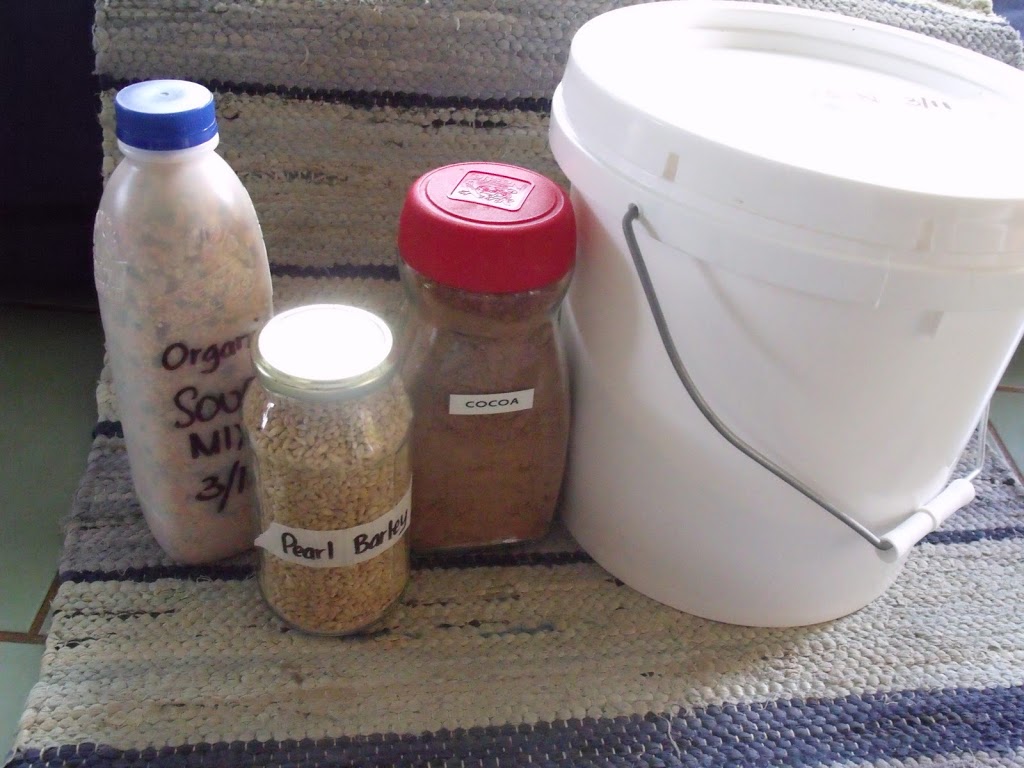No products in the cart.
Breakfasts
Storage Tips for Bulk Buying – Guest Post

Guest Post by my friend, Bel Moore
of Homegrown
This is Part 2 of Bulk Food Buying & Co-ops. Not everyone has a great, big freezer like I do, so my friend Bel has kindly offered to explain how she stores her bulk food orders without a big freezer…
I’m lucky enough to be involved in the same co-ops as Jo. We often get up to 150kg of food delivered at once (due to ordering for the following 6 months). For me, this is sometimes an overwhelming amount to put away. I have a little kitchen with a small pantry cupboard, and I use a few shelves of the linen cupboard for some food storage too. I don’t have a large chest freezer like Jo’s, so I can’t just drop the bags into the freezer when they arrive.
I normally take a few days to put everything away, and this is the process…
I decant the grains, legumes and flours into 10L buckets with lids. The buckets came from a yoghurt shop, I believe, and were used only once before being discarded. They are plain white, strong and food-grade with well-sealing lids. I buy them through our local LETS group for less than half the price of similar buckets at the hardware store in town.
Some bulk purchases I decant into unused plastic bottles which I get from a local factory when they are labelled or dated wrong and need to be discarded. They’re perfectly clean and useable, just not right to go onto the supermarket shelves. I really like to reuse containers when I can, rather than buying new ones. These bottles stack really well in the freezer space I do have, and when I need some grain for the kitchen, I need only grab out one bottle at a time (rather than a hefty bucket or sack full!)
Other products I decant into clean glass jars. Friends have saved me some fantastic 2L olive jars with screw-on metal lids, and also very large coffee jars. These are great for the pantry as it’s easy to see what’s in them, and they don’t taint the contents with any plastic smell or flavour as some expensive brand-name canisters of mine have in the past in our hot climate. I soak the jars in a bucket in the laundry for 2 days or so, then the labels just slip right off. A good scrub in hot soapy water, and they are dried and ready to be reused.
I label the buckets with some masking tape and a marking pen – naming the contents and the date packed. I write directly onto the bottles (as I only use them once) and I make labels for the jars using my Dymo label maker. I share my kitchen with at least 3 other family members every day, so it’s important that everything is accessible and easy to identify.
Products I use a lot of are simply kept in the buckets and accessed by the cupful or more as I need them (the buckets are in the laundry, a few steps from the Thermomix. I mean kitchen!) These have never had weevils or had mould, so the buckets must have a good seal. Other products spend at least a few days in the freezer, and are then packed onto shelves (or on top of the freezer – the door is on the front) in their very airtight containers. Freezing them soon after they arrive kills weevil eggs and prevents them from hatching. Weevil eggs can be inside the grain kernel when it is still on the stalk, in the paddock!
When I first started bulk buying, I didn’t have buckets or jars or containers and so I used large plastic ziplock bags. Unfortunately, bugs can chew through plastic, and it can tear, and it’s hard to shuffle all the same-looking bags around a very full freezer. It was okay in the beginning, but I’m glad I now have more solid storage solutions for our bulk order. I no longer have a film of flour with bits of lentil and buckwheat across the bottom of my freezer from accidental spills!
My latest order cost me almost $800 and a few hours of my time, but it’s really worth it because I don’t have to pay inflated prices at the health store for quality organic ingredients. I always have plenty on hand, which suits my shopping habits as we are a 70km round trip from the health store and major supermarket. I encourage others to look into creating a co-op using the helpful hints posted by Jo.
* * * * *
Thanks for those great tips, Bel!
If anyone wants to have a chat or ask questions about co-ops and storing bulk foods, or if you have any hints of your own to share, come on over to my Quirky Cooking Facebook page – we have some great discussions there! And if you’re part of a co-op that doesn’t mind some more members joining you, let us know so we can spread the word. Thanks!

Thanks Bel! This has given me the confidence to look into bulk buying, as we don’t have much freezer space either. And we’re in Sydney, so our climate should be even more kind than yours!
Hi, thanks for your guest post I thought that you had to have a freezer to bulk it. What grains do you buy? And how much do you think it saves you?
Hi 🙂 Have a look at this post and it will explain to you what I buy and how much it saves me: http://quirkycooking.blogspot.com/2011/03/bulk-food-buying-co-ops.html
I actually enjoyed reading through this posting. Many thanks.
Freezers
I get free bread, buns and pies from a bakery every Tuesday, and lately I’ve been grabbing their 10 litre food grade buckets with lids for free.
I was going to use them for food storage but so far all I’ve used them for is water storage when it pours.
Just going to say the same as above, go to your local bakery, restaurant or even supermarket deli as they all have products delivered in food grade buckets (500gm to 20 litre) and bottles (plastic & glass) and often they just throw them out as they deal with so many. Plastic beer brewing kegs are also a great way to store in bulk but of course you have to buy them. Happy hunting & gathering